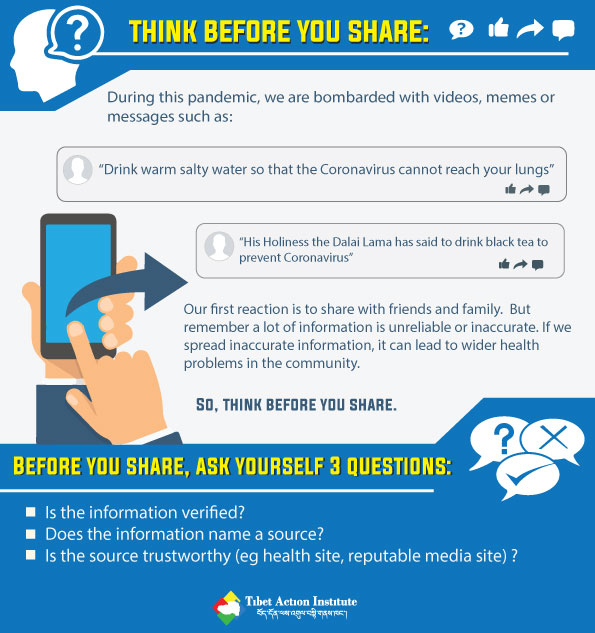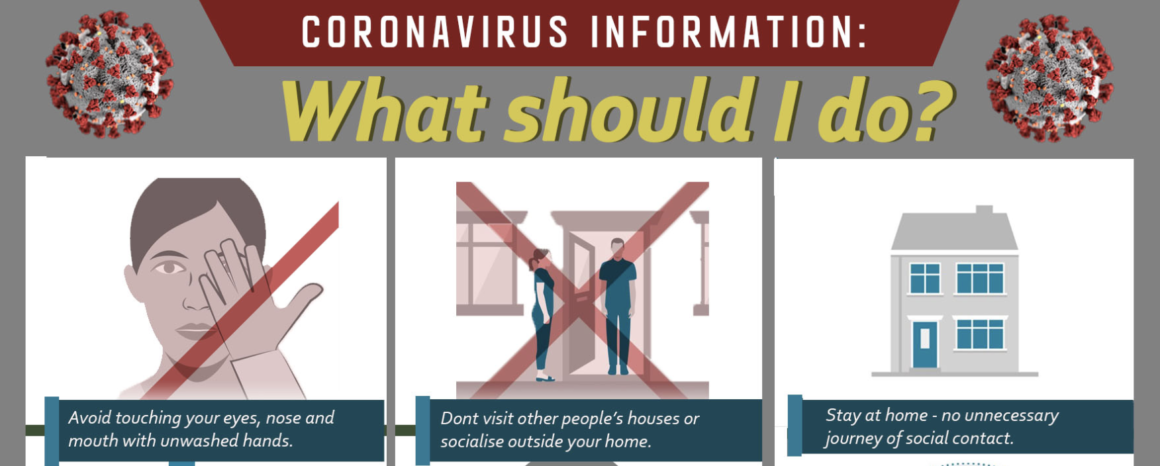Misinformation in the Tibetan Community in the Time of the Coronavirus Pandemic
A few weeks ago, I was driving from Dharamsala to McLeod and gave a lift to an old Tibetan Amala. During the ride, she told me that she was going to Mcleod Ganj to buy a facemask for Coronavirus as she was unable to buy any in Gangkyi. I was curious to know what prompted her to go and buy the masks. She said she’d heard on the news that some people had been diagnosed with Coronavirus. However, this was incorrect. The actual news was that a few foreigners who had traveled abroad had been called by the CMO (Chief Medical Officer) of Kangra District and asked about their travels. However, what she had perceived and also heard from others was that a few cases of Coronavirus had been seen in Dharamsala. This led me to think about how such misinformation can have an impact.
Just last week, two pieces of news have been in the spotlight. The most recent news—which turned out to be “fake news”—about His Holiness the Dalai Lama advising people to drink black tea to prevent Coronavirus had spread to all corners of the world among Tibetans. This had led to the office of His Holiness having to put out a public statement about this being false. The notion that drinking black tea will help prevent Coronavirus could have led to a false sense of security and led to severe impacts.
In the last few weeks, everyone’s Wechat, Facebook, and WhatsApp feed has probably been bombarded with information about Coronavirus, often with information about how to protect oneself from this pandemic. But if you look closely, a lot of the information being shared is inaccurate, sometimes harmless but at times with severe impact.
The other false news was about a monk from Ganden Monastery in Mundgod who was reportedly diagnosed with Coronavirus using Tibetan text and a photo of a Kannada news story with a picture of Tibetan monk wearing a mask. However, the real story was that a photo of a monk wearing a mask was used in a story about Coronavirus. The monk himself did not have Coronavirus. The Ganden monastery administration came out with a statement to clarify that this reporting of the monk’s diagnosis was false news. However, there can be real impact of such misinformation and there is now a lot of chaos in Mundgod which may not be a direct result of this news but it had a part to play in the following developments. There are now police in the settlement as well as instances where Tibetans have to seek permission to leave the settlement area. Also, Tibetans coming from anywhere into the settlement need to report to the local leader and the hospital. This applies even for Tibetans coming to the settlement from within India, something not implemented currently anywhere else in the country at this time(March 20, 2020).
Combating misinformation around the Coronavirus is a challenge that is not unique to Tibetans but a global one. In order to tackle this problem the responsibility, in my view, lies with each individual to follow a simple mantra: “Think Before You Share.” Is the content you are sharing verified? Is there a source named that shows you where the information has come from? Is that source legitimate and credible? I understand that this will not stop all misinformation out there. However, it will reduce the spread of such news and maybe stop someone from becoming at risk after following false information. Please take a look at https://tibetaction.net/digitalsecurity/onlinesecurity/#share.
Through TibCERT, Tibet Action is currently working on a project in which TibCERT will monitor social media, adding updates to the TibCERT knowledgebase website https://learn.tibcert.org/category/disinfo-misinfo/ to keep the community informed of false news being shared. This project will be along the lines of global websites like “Snopes” https://www.snopes.com/, a platform used to combat fake news. TibCERT has a helpdesk through which Tibetans can submit news that they want to verify by emailing us what they would like us to verify at [email protected] or you can send a facebook message at https://www.facebook.com/tibcert or send a DM to us on twitter at https://twitter.com/tibcert which will automatically create a Ticket in our HelpDesk so that we can respond accordingly. At this stage, TibCERT will work on verifying these stories, but in the future, we would like to bring in verified supporters for this project who can also work with TibCERT to verify and stop the spread of misinformation/disinformation in the community focusing not only on Coronavirus but on other issues as well.
To conclude, I think following the steps in the infographic below by BBC is a good first step to combat Coronavirus.


Blog post by Lobsang Sither Gyatso
Digital Security Program Director




Leave a Reply